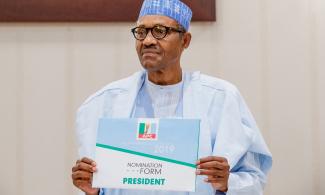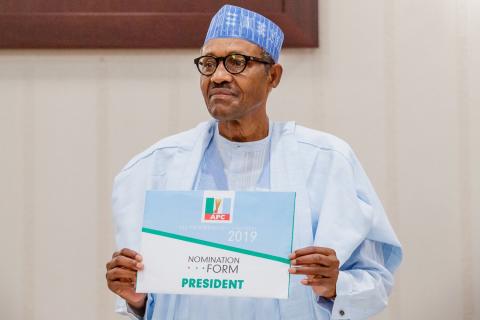
Going by the total revenues so far generated by key revenue agencies, including the Federal Inland Revenue Service (FIRS) and the Nigeria Customs Service (NCS) as at August, there’s no reason why some releases should not have been effected by now.

Few days into the last quarter of the year, the federal government is yet to begin the implementation of the 2018 capital budget, a development that is already impacting the economy adversely.
The N9.12 trillion aggregate budget, which was passed by the National Assembly on May 26, and signed into law on June 20, 2018 by President Muhammadu Buhari, has a capital component of N2.8 trillion.
Over three months after presidential assent and about three months to the end of the year, the implementation of the capital budget has remained in abeyance.
THISDAY investigations revealed that failure to implement the capital vote might have nothing to do with
paucity of funds.
Going by the total revenues so far generated by key revenue agencies, including the Federal Inland Revenue Service (FIRS) and the Nigeria Customs Service (NCS) as at August, there’s no reason why some releases should not have been effected by now.
According to the NCS’ spokesman, Mr. Joseph Attah, total collections as at the end of August stood at about N792.10 billion.
The FIRS’ spokesman, Mr. Wahab Gbadamosi, also told THISDAY that the revenue generating agency had as at August ending raked in about N3.5 trillion.
Critical government ministries and agencies, including the Federal Ministry of Agriculture and Rural Development, a ministry critical for economic transformation and job creation is currently almost crippled by the continued delay in the release of funds, with serious activities presently lacking.
Only recently, the Minister of Agriculture and Rural Development, Chief Audu Ogbeh, openly expressed concern over the delay in the release of funds.
In the same vein, the Presidential Amnesty Programme (PAP), a major interventionist initiative which has helped to mitigate restiveness in the Niger Delta region is also experiencing financial crunch.
The Senate Committee on Niger Delta lamented recently that of the N65 billion budgeted for PAP this year, only N5 billion had been released, which translates to approximately 7.7 per cent of the budgeted sum.
An assessment of government ministries, departments and agencies (MDAs) currently indicate a lull in their activities owing to the fact that funds have not been released to execute planned projects.
Some of the explanations gathered from unofficial quarters, in the absence of reactions by competent authorities, was that there is no money.
But the argument over paucity of funds flies in the face of stark reality.
The total revenue projection for 2018 is N7.17 trillion.
With over N4.792 trillion revenue already realised from the combined revenue generation by two agencies—FIRS and Customs within eight months, there is no plausible explanation for the federal government’s failure to release even the first tranche of the 2018 capital vote, more than three months after the Appropriation Act was assented to by President Buhari.
The 2018 Budget is anchored on a non-oil revenue projection of N4.18 trillion, an indication that with the combined generation of N4.792 trillion by the customs and FIRS, the federal government had overshot the projection before the third quarter of the year.
Similarly, although the 2018 budget is predicated on a benchmark oil price of $51 per barrel, sales have averaged $60 per barrel since the beginning of the year.
Oil revenue projection for the year is N2.99 trillion.
The failure of the government to begin the release of funds for the execution of capital projects for which reason it introduced expansionary fiscal plans since 2016 has fueled insinuations that the Buhari administration is deliberately applying liquidity squeeze as an underhand ploy ahead of the 2019 polls.
According to speculations, since vote–buying has become a major factor in recent electoral calculations, the non-release of capital vote would create more financial challenges for the electorate, making them easy prey for vote-buying by the ruling All Progressives Congress (APC).
While the speculations make the rounds, the failure of the government to come up with official explanations for the non-release of funds to implement capital projects over three months after President Buhari signed the budget, appear to lend credence to the insinuations.
But given that government spending is critical to economic activities among others, the continued delay in the release of funds is already taking its toll on the economy.
Several contractors, especially those handling road projects have reportedly abandoned such critical infrastructure projects across the country, and laid off their workers.
Several efforts to speak with officials of the Ministry of Power, Works and Housing on their reaction to the non-release of capital vote were futile.
Out of the ministry’s N724,688 billion total budgetary allocation for the year, N682,959,550,242 billion is for capital projects.
Some of the ministry’s key road projects are the 2nd Niger Bridge (N9.2 billion), and the reconstruction and rehabilitation of several roads nationwide (about N344 billion).
Investigations revealed that these projects are currently not actively executed by the contractors.
At some of the project sites, skeletal activities are ongoing, a situation that has worsened the conditions of the roads, especially in the southern part of the country.
In August, THISDAY sought the explanation of the Ministry of Finance on the delay in the release of capital projects vote.
No official was willing to provide any explanation, but a top aide of the immediate-past minister, Mrs. Kemi Adeosun, said that the federal government was on the verge of releasing funds for the implementation of the capital component of the N9.12 trillion 2018 budget in the second week of August.
He had explained that besides procurement issues, the major cause of the delay in commencing the release of the capital vote centred around the recurring controversy over the Federation Account Allocation Committee (FAAC) vis-à-vis remittances by the Nigerian National Petroleum Corporation (NNPC) into the Federation Account.